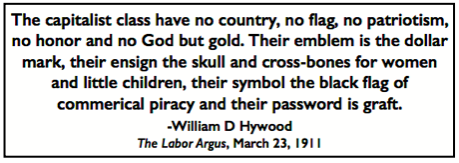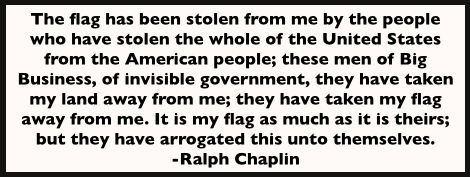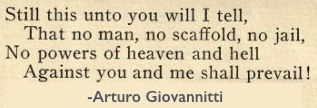 —————
—————
Hellraisers Journal – Friday March 13, 1914
Chicago, Illinois – Former Michigan Gunthug Testifies Before House Committee
From the Chicago Day Book of March 10, 1914:
 —————
—————
Hellraisers Journal – Friday March 13, 1914
Chicago, Illinois – Former Michigan Gunthug Testifies Before House Committee
From the Chicago Day Book of March 10, 1914:
 —————
—————
Hellraisers Journal – Tuesday February 28, 1922
Philadelphia Local 8 of I. W. W. on the Firing Line
From The Messenger of February 1922:
LOCAL 8 OF I. W. W. ON FIRING LINE
THE Administration’s policy toward the I. W. W. has been everything but frank, just and fair. On the contrary it has been mean, petty and cowardly. Believing that public sentiment was not as aroused and as insistent for the release of the members of the Industrial Workers of the World as it was for other prisoners charged with the violation of war-time laws it announced a different policy in dealing with the I. W. W. cases.
It was well established by the action of the Courts of Appeals of the seventh and eighth districts in the Chicago and Wichita cases, that the I. W. W.’s were found innocent of acts of sabotage or other industrial crimes. Their legal status now is the same as that of Debs before his release. In other words they are held in prison for expressing opinions in opposition to war.
As was pointed out in the foreword of the brief of attorney Otto Christensen, “many of the offenses that the I. W. W.’s were convicted of in the lower courts having been nullified by the action of the Court of Appeals, the legal basis for holding them in prison likewise has been changed.” “Since,” according to the Civil Liberties Union, the reversal of the industrial courts on which three-fourths of the evidence was introduced, these cases are in every essential analogous to the case of Mr. Debs.”
In view of the foregoing facts, it is apparent that the difference in policy in handling the cases of the Industrial Unionists, arises out of prejudice and class hatred.
It appears that the Administration acts not out of consideration for justice and right, established by facts and reason; but only out of fear of a general upsurge of an outraged public against blind, unreasoning intolerant, autocratic, Kaiser-like methods.
Recognizing this fact, Local 8 of the Marine Transport Workers of Philadelphia, has, in accordance with its general policy of enlightened, militant, revolutionary action, proceeded to arrange an intensive campaign of education and agitation in the interest of the 118 class-war and political prisoners still languishing in prison.
 ———-
———-
Hellraisers Journal – Friday April 22, 1921
Chicago, Illinois – Federal Officials Confirm Haywood is in Russia
From The Leavenworth Post of April 21, 1921:
(By The Associated Press.)
Chicago, April 21.-Federal officials today received confidential information that William D. Haywood, secretary of the Industrial Workers of the World who was scheduled to begin a sentence at United States penitentiary, at Leavenworth this week, had fled from the United States and now is in either Moscow or Riga.
Attorney Admits Departure.
Otto Christensen, attorney for Haywood, said he had been informed that Haywood sailed from New York on the Oscar Second about April 1, and landed at Riga about April 16. He said he thought Haywood had gone to Russia on a personal mission and was not fleeing from the penitentiary sentence.
Authorities Start Search.
Charles F. Clyne, United States district attorney announced that search had been started for Haywood.
“He is not at Leavenworth, Chicago, nor New York, and we have private information that he has landed either at Moscow or Riga,” said Clyne.
“That is all we know about it but we expect to have definite information very quickly.”
 ———-
———-
Hellraisers Journal – Thursday July 31, 1919
Leavenworth, Kansas – Haywood and Miller Released on Bond
From The Leavenworth Times of July 29, 1919:
HAYWOOD WILL GO ON SPEAKING
TOUR OF THE U. S.
—–
Says That I. W. W.’s Want Him to
Address Them in Many Places.
—–NEVER WAS DISLOYAL, HE SAYS.
—–
Is Opposed to War, but Wanted America to Win
-Has No Personal Complaint to Make
About Prison Treatment.
—–
William D. Haywood, I. W. W. leader, was released from the Federal penitentiary shortly after 10 o’clock yesterday morning. He did not get out Sunday as expected, because the letter containing his approved bond did not reach the prison until yesterday morning. Haywood was already for departure and he went out within half an hour after the bond was received.
The bond for $15,000 for the release of Haywood was signed by Otto C. Cristienson [Christensen], William Bross Lloyd and Mary C. Marcy. They are all said to live in Chicago, although the palace of residence of the signers was not given. There has been considerable trouble about getting a bond for Haywood that Judge Landis of the Federal court in Chicago would approve, and it can be taken for granted that this is a guilt edge one.
A bond came in on the same mail for the release of Francis C. Miller, another I. W. W. leader serving a ten year term. It was for $10,000 and was signed by Otto C. Christienson, Margaret Schipman, Albert De Silvers and John Metzen. The bond for the release of Ralph Chaplin did not come in and he was unable to go out with Haywood and Miller.
 ———-
———-
Hellraisers Journal – Monday April 14, 1919
Chicago, Illinois – Bail Granted to I. W. W. Class-War Prisoners
From New Solidarity of April 12, 1919:
Don’t worry, Fellow Worker,
all we’re going to need
from now on is guts.
-Frank Little
~~~~~~~~~~~~~~~~~~~~~~~~~~~~~~~~~~~~~~~~~~~~~
Hellraisers Journal, Thursday August 29, 1918
From the Cook County Jail: “Hold the Fort! We have nothing to regret.”
From The Ohio Socialist of August 28, 1918:
A Letter To All Reds
After 4 1-2 months of the most bitterly fought legal battle in the history of American labor, the prosecution scored an initial victory in the trial of one hundred of our fellow workers in Chicago.
A masterly defense was provided by Attorney George F. Vanderveer, assisted by William B. Cleary of Arizona, Otto Christensen of Chicago and Miss Caroline A.Lowe of Seattle. It is not too much to say that everything seemed to point to an acquittal, even the charge to the jury by Judge Landis, who, we gladly admit, proved himself to be impartial in all respects. The verdict of “Guilty” came as a shock, a thunderbolt from a clear sky.
The jury was out fifty-five minutes. It may have been only a formality that they left their seats to go to the jury room. A Chicago paper states it is evident that only one ballot was taken.
Motion for a new trial will be filed immediately and if necessary, appeal will be taken. All defendants are now in Cook County Jail. A word of cheer from the fellow workers in the field will be appreciated by them.
Fellow Worker Haywood gave out the following:
[Said Haywood, at the county jail:]
I have no fault to find with Judge Landis, and none of the rest of us have. He was fair to us, absolutely square throughout the whole trial. His instructions were fair, I thought, and certainly he treated us excellently while the trial was in progress.
How often have court rooms served as undertaking parlors
for the aspirations of rebellious workers?
-Harrison George
~~~~~~~~~~~~~~~~~~~~~~~~~~~~~~~~~~~~~~~~~~~~
Hellraisers Journal, Sunday August 18, 1918
Chicago, Illinois – “Guilty Is Verdict Against I. W. W.”
At 5:30 p. m. on Saturday August 17, 1918, the Federal Trial of the leaders of the Industrial Workers of the World ended when the jury announced its verdict:
Guilty as charged in the indictment.
Asked for his response to the verdict, Fellow Worker Harrison George stated:
If America can stand it, I am sure the I. W. W. can.
NEBEKER concluded his speech at 10:33 a. m. [August 17th], and the crowded courtroom listened expectantly for Vanderveer to open the floodgates of oratory. Nebeker had used less than one hour of the two allotted to the prosecution, and his assistant, Claude R. Porter, was to finish the presentation of their side with a flag-waving broadside of denunciatory eloquence that was not only to sway the jury, but was intended to elect him governor of Iowa. For, thoughtful of his campaign in that state, he had on the previous day sent advance copies of his speech to a great many of his partisan papers in Iowa for release on that day, when he intended to talk himself into immortality.
Judge, oh, ye gods! how deeply he was wounded when Vanderveer forbore to orate, only rising to thank the jury for their patience during the long trial and asking their consideration for a “Christian judgment.” The spectators were nonplussed at such an unusual situation, while Porter, pale and stunned, sat voiceless, trying to grasp the fact that Vanderveer, by refusing to address the jury, had cut off further argument, and that he, Porter, was up against wiring those Iowa papers to kill his oration, already going into the presses.

~~~~~~~~~~~~~~~~~~~~~~~~~~~~~~~~~~~~~~~~~~~~
Hellraisers Journal, Tuesday July 2, 1918
Chicago, Illinois – “Chalk Talk” by Red Doran at I. W. W. Trial
On Friday, June 28th, Attorney Otto Christensen called forth John T. “Red” Doran as a witness for the defense. In place of the usual witness chair was found a large easel and a cloth blackboard upon which Fellow Worker Red Doran launched into an illustrated address describing the current economic system and explaining how it is based upon robbery, degradation and exploitation of the many for the benefit of the few.
From El Paso Morning Times of June 30, 1918:
Red Doran, Lecturer
for I.W.W. Society,
Given Trial in Court
—–By Associated Press.
Chicago, June 29.-Red Doran, who was permitted to lecture in court [June 28th] as part of the evidence in the I. W. W. defense and spoke of alleged unsanitary conditions in northwestern lumber camps, had only spasmodic experiences as a worker in these camps, it appeared on cross examination today. He admitted that he never had worked in a lumber camp or mill, except in the blacksmith.
Charles Ashleigh, the third defendant to take the witness stand, said he became interested in the labor movement in England. In 1903 when he came to the United states he became interested in the I. W. W. in New York he said he did some work for Miss Anne Morgan.
He testified that the I. W. W., aims at industrial rather than governmental reform. In the United States, he said, there is an advanced political democracy and an industrial autocracy.
“So long as this condition exists, industry is little more than a sentiment,” he said.
Charles R. Griffith [Griffin], another defendant, related numerous experiences with his employers during 18 years spent in the woods as a lumberjack. He defended the I. W. W. propaganda and told of conditions which he said had been responsible for many strikes in the northwest lumber camps.

Hellraisers Journal, Thursday April 4, 1918
Chicago, Illinois – Federal Trial of I. W. W. Underway
From The Salt Lake Tribune of April 1, 1918:
100 I. W. W.’S WILL GO TO TRIAL TODAY
—–
Government’s Charged Include Sabotage,
Intrigue and Conspiracy.
—–
CHICAGO, March 31.-More than 100 Industrial Workers of the World will go on trial tomorrow before Federal Judge Landis, charged with conspiracy to disrupt the government’s war programme.
One hundred and sixty-five men and one woman were named in the true bill returned by the September grand jury, but forty escaped capture. Cases against ten have been dismissed, and three, including the woman, Elizabeth Gurley Flynn of New York, have been granted separate trials.
The government’s charges against the defendants include allegations of sabotage, including the slowing down of production and the wanton spoilage of material, propaganda for strikes to delay the output of war munitions and covert intrigue against military service.
Don’t worry, Fellow Worker,
all we’re going to need
from now on is guts.
-Frank Little
Hellraisers Journal: Sunday December 16, 1917
Chicago, Illinois – I. W. W. Defendants Appear Before Judge Landis
From the Kansas Pittsburg Daily Headlight of December 15, 1917:
I.W.W. DEFENDANTS FILLED
A COURT ROOM
—
BEFORE JUDGE LANDIS AT CHICAGO,
ACCUSED AGITATORS PLEADED NOT GUILTY.
—–
“American Bolsheviki Without Whiskers,”
as U. S. Lawyer Described Them,
Appeared to Answer Conspiracy Charge.
—–
Chicago, Dec. 15.-One hundred and three alleged members of the Industrial Workers of the World, probably the largest number ever assembled in one court room to answer the charges of conspiracy against the federal government, pleaded “not guilty” when arraigned before Judge Landis in the United States district court today.
In general appearance the defendants resembled a typical jury panel. There were exceptions, however, for among the I. W. W. there are not a few who pretend to literary merit. There are some who confess themselves poets, and a few are orators. These might be distinguished by the flowing Windsor tie and the soft collar of the artist or musician, by the stiff rearward brush of the hair, or, in one or two instances, by a neatly trimmed Van Dyke beard. One of the government lawyers referred to them as “the American Bolsheviki, without the whiskers.”